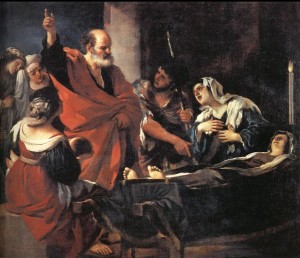The story of Tabitha is the story of a loving church community. Love caused Tabitha to do her charitable works. Love caused the other widows to appreciate her work and to call for Peter when she had died. And love caused Peter to make a two hour’s walk from Lydda to Joppa (in our days part of Tel-Aviv) and to pray for her resurrection.
 During Lent I spoke to you about change. Lent is the perfect time to reflect on where we stand, on our sufferings and limitations. We may have admitted that we can do better, that we need help, even as long standing church goers and disciples of Jesus. But then we may have wondered how to accomplish this. How Jesus would be able to not just comfort and lead us, but to actually transform us and make us more effective followers of Him in this rapidly changing world. But now, after Easter and in the light of the resurrection, we must concede that “for God everything is possible”. That if God can raise Jesus from the dead, he can also wake us up from any spiritual lethargy or indifference or confusion or stagnation.
During Lent I spoke to you about change. Lent is the perfect time to reflect on where we stand, on our sufferings and limitations. We may have admitted that we can do better, that we need help, even as long standing church goers and disciples of Jesus. But then we may have wondered how to accomplish this. How Jesus would be able to not just comfort and lead us, but to actually transform us and make us more effective followers of Him in this rapidly changing world. But now, after Easter and in the light of the resurrection, we must concede that “for God everything is possible”. That if God can raise Jesus from the dead, he can also wake us up from any spiritual lethargy or indifference or confusion or stagnation.
Spiritual awakening
This story shows that the power of God to raise us from the dead is not a one-time anomaly. The bible reports several instances of resurrections, and prophesies resurrections on a cosmic scale. But there are also calls to a spiritual awakening which is equally, if not more important. In Efesians 5:14 St. Paul writes, “for everything that becomes visible is light. Therefore it says, “Sleeper, awake! Rise from the dead, and Christ will shine on you.”’
And in Revelations (3:1-6) the church in Sardis is told: “I know all the things you do, and that you have a reputation for being alive—but you are dead. Wake up! Strengthen what little remains, for even what is left is almost dead… Go back to what you heard and believed at first; hold to it firmly. Repent and turn to me again.”
The dignity of gentiles and genders
At the beginning of the chapter we read about the conversion of Saul and the beginning of his ministry. Although St. Paul became the great apostle of the Gentiles, St. Peter also preached outside Judea. Verse 31 mentions Galilee and Samaria, but it is certain that he also spent time in Antioch, and there are indications that he went to Rome and various cities in Asia Minor.
In chapter 10, Peter is still in Joppa when he receives the vision of the large sheet with unclean animals. Later he understood that God wanted him to preach to the Gentiles as well as the Jews.
So the whole context is one of acceptance and equality. As it says in Gal. 3:28 in Christ, “there is no Jew or Greek, slave or free, male or female; for you are all one in Christ Jesus”. And so in the Bible we have several stories of people being resurrected from the dead, but this includes two women, the daughter of Jaïrus, and, after Christ’s resurrection, Tabitha. In a time when women were still regarded as property, this is significant. In Christianity, they were recognized as complete and valuable individuals from the beginning.
There were still traces of inequality, for instance when Luke writes about “saints and widows”, as if the widows were not saints, but radical changes are often difficult and time-consuming.
Through the eyes of Tabitha
Now who is the main character in this story? Is it Tabitha, or Peter, or even the widows? I believe they all have something to tell us. And we figure in this story as well, depending on whom we identify with.
So let us first imagine you are Tabitha. We don’t know all that much about you, except that you are a creative, faithful and helpful person. And that you got ill and before long you died. Just before you died you must have thought that Jesus would resurrect you at the end of time. But now you open your eyes, sit up and you have St. Peter in front of you. This instantly gives you a completely different idea about the church. Here are people, Peter and Paul, who are fulfilling the words of Jesus, “Very truly I tell you, whoever believes in me will do the works I have been doing, and they will do even greater things than these”. And although the believers of the local church did not actually perform the miracle,They had faith enough to call for Peter.
Maybe you have always been wondering if they appreciated all the things you made. Maybe you thought they were only being polite when they looked at your fabrics and art. Widows were poor in those days and they would have been glad with any clothing. But now you hear that the first thing they did was to show to Peter what you had made! You actually counted for them. And you don’t know it yet, but when you will be resurrected by Jesus, you will hear that you have even made it into the sacred writings. Doesn’t that teach us to trust, not only in God, but in our fellow-believers as well?
Through the eyes of a simple believer
Now imagine you are one of the widows, not an apostle, not an evangelist, not on the church council. When Tabitha dies, you are very sad. You do what you think you have to do, and that is mourn. You can manage the rituals. You bring Tabitha to the upper room, where Tabitha used to pray, where she was and will be close to God. You don’t quite understand, but you can feel the symbolism in this. When Jesus had the last supper with his disciples in another upper room, this was also at the same time a place of goodbye and a place where heaven and earth touched each other. A place of tremendous power, that would be remembered for ever. And you know that you can do more than perform these rituals, but you think you don’t have the talent for it. You could not possibly revive dead bodies or a dead church, or anything, really. Now I said, you think you don’t have the talent, because it is all a matter of faith. But you also know about the resurrection of Christ and arrival of the Holy Spirit at Pentecost. And you are hoping for another miracle to happen, so you call for this heavyweight called Peter.
First you think that he understands you, for he looks with interest at the things Tabitha had made. He also seems to appreciate the ceremony you have come up with. But then he sends you out of the room, and some of your friends are a little insulted. You realize that Peter probably has his reasons for deviating from the protocol. After all, you did ask him to do something unusual, didn’t you?
I think this teaches us that that we cannot always sit in the front seat. Nowadays parishes are led, not by one person, but by a council, with some rotation of members. But there will always be people who are not on the council. However, if we cooperate, we can still achieve miraculous results, like the widows did when they called for Peter.
Through the eyes of Peter
Now let us imagine you are Peter. You have learned quite some lessons in life. It has made you stronger. But you are still very aware of your past and present imperfections. You don’t want to let Christ down again. You are inspired by his example and his trust. When the people of Joppa call for you, you are touched by their needs and their trust. You don’t think about their expectations which may be too high, but just go to support them.
But what do you tell them when they are so clearly living in the past and showing you all these things that Tabitha had made? At some point you realize that only a miracle can help them. And at some point you realize that this is also what God wants you to do. Now there is no turning back.
Prayers are needed, focussed prayers. You would very much like the widows and other believers to pray with you. But you find yourself alone, because they are still wailing and talking and performing rituals. How can a minister work without the assistance of like-minded parishioners? You may feel tempted to just give up and move on. But then you realize that these people do have faith, and that they depend on you. And you may already suspect that a miracle will do more to change them than many sermons could. So you gently send them away and listen to the Spirit of God, to discern His wisdom that is not ours.
Then you pray for the people, just like Moses did for Israel, and for Tabitha, and the miracle happens. The resulting revival is not just the one of Tabitha, but of Joppa and the whole surrounding area. Later, when you travel to Cornelius, a number of believers will accompany you. They will have become much more adventurous than you could ever have thought. Then you will know for sure that this could not have been done by words alone. And you are glad that you showed patience and compassion.
The good news
So now we have looked through the eyes of the different people in this story.
It is always good to try and see things through the eyes of other people.
I may think I am right, but how would someone else experience the same events, the same sermon, the same liturgy, the same email, the same rules and decisions? And putting yourself in the position of another is not only a social thing, there is a spiritual dimension to it as well. For it is what God is doing with us all the time. And this causes him to hear and to help us continually.
Before the second coming of Christ, physical resurrections are clearly the exception to the rule. Even in biblical times there have not been too many of them. But the story of Tabitha teaches us that the church is not that boring as it seems. It may still have a few surprises for us up its sleeve.
It also teaches church leaders to be patient with their flock and not to treat them like employees. But most of all it teaches us that the power of Easter does not stop at Easter. It can still be a sources of life today, for us as individuals, for the church, and for the world.
Just as in the days of Jesus, not everyone saw the meaning of the miracle.
But to those who did, Jesus said, “My sheep hear my voice. I know them, and they follow me. 28 I give them eternal life, and they will never perish.
No one will snatch them out of my hand.” And if he says no one, he means no one. We are in the hands of Jesus, not in the hands of the world, not even in the hands of the church. Likewise the church is in the hands of Jesus,
despite all the mistakes we have made and will probably continue to make.
And ultimately the world is in His hand as well.
Glory be to the one and only Creator, Lord, Redeemer and friend.
Amen.






Leave A Comment